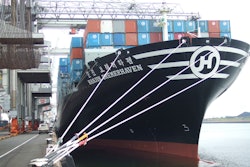Feb. 04--The blockage of the southern-bound highway by farmers has begun to take its toll on goods shipments such as seafood, as protesters vowed to put more pressure on the government to accelerate delayed rice payments.
Yoo Chienyuenyongpong, chairman of the Land Transport Federation of Thailand, said shipments bound to and from the South face delays of about five hours, as the blockage of Rama II Road has lasted three days.
Rice growers from several western and central provinces are blocking the highway at the Wang Manao intersection in Ratchaburi's Pak Tho district, demanding the government quickly come up with delayed payments under the rice pledging scheme.
"Transport operators have managed to use alternative indirect routes, which resulted in delays of four or five hours," said Mr Yoo.
Shipments of consumer goods have been affected along with seafood, the majority of which comes from the southern provinces such as Prachuap Khiri Khan and Chumphon, he said.
"We hope negotiations with the protest farmers continue and the road blockage is not prolonged," added Mr Yoo.
Federation adviser Thongyu Khongkan said the blockage has led to higher transportation costs and could cause price increases if the situation is prolonged. Eventually consumer goods and fuels supplies might face a shortage.
"If the protest lasts longer than a week, a supply shortage would be unavoidable," he said.
"Economies in the southern provinces will suffer after being affected by natural rubber price protests last year."
Poj Aramwattananont, president of the Thai Frozen Foods Association, said shipments now take longer to reach factories in the central provinces of Samut Sakhon and Samut Songkhram due to traffic jams on other routes.
Visit Limlurcha, vice-president of the Federation of Thai Industries' food processing industry club, said Rama II Road houses a large amount of seafood producers, and usually ice is used to transport fresh food and seafood. If trucks need to travel for longer periods, more ice will be needed.
Another alternative is to store the products in a nearby chiller or freezing room, said Mr Visit.
Either way, it adds to costs if the situation lingers for a long period, especially for small and medium-sized enterprises.
"Another important outcome is domestic consumers will choose to consume other types of food if the products cannot be transported," said Mr Visit.
Paisarn Aowstaporn, an executive vice-president of Oishi Group Plc, the operator of Oishi restaurants, said it has prepared some measures to handle the situation if the blockade worsens.
Its logistics providers will find alternative routes to transport foods and raw materials from Bangkok to the South.
The company has 10 restaurants in that region.
"If we can't find alternative routes, we'll transport our foods and raw materials by air. We used air cargo during the floods in 2011," said Mr Paisarn.
Copyright 2014 - Bangkok Post, Thailand


















